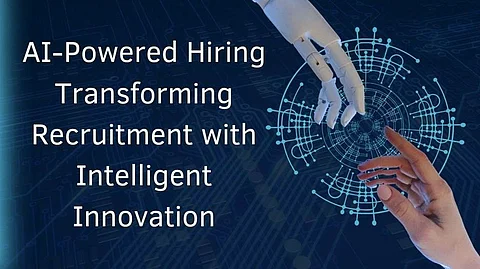

In this rapidly growing digital era, artificial intelligence has become a game-changer in transforming recruitment strategies. The integration of AI in talent acquisition has streamlined hiring processes, improved efficiency, and enhanced candidate experience. In this article, we explore key innovations in AI-powered recruitment based on the insights provided by Sudeep Annappa Shanubhog, a researcher with expertise in advanced recruitment technologies.
AI will change the way firms hire employees; it will automate repetitive tasks and allow for intelligent decision-making. Machine learning algorithms and natural language processing have been used extensively for the evaluation process of screening resumes and analysis of prospective candidate profiles with better accuracy in predicting the job fit. Added benefits of organizations who have installed AI-powered systems for hiring include reduced cycles in hiring and improved quality of hires through data-driven assessments.
Hiring normally entails screening applicants manually and manually handling applications. Most of these things have been dealt with by AI in the form of machine learning evaluation models that can scan practically the whole applicant database in seconds. It is a system trained with the historical hiring data such that it can throw the bone to potential recruiter-types. AI-related organizations are said to have more improved candidate success prediction and higher matching of job roles with applicants' skill sets.
The largest new development in AI recruitment is workflow automation by intelligent software. It helps in automating stages of the recruitment process such as interview scheduling and documentation checks and follow-ups. Automating these activities frees human resource professionals for critical thinking and relationship development with potential hires, because they now have less administrative tasks to be overwhelmed by. Automated communication will also ensure that the rate in which the candidates get responses improves, thereby increasing the overall experience of the candidate.
AI-powered recruitment tools are designed to mitigate unconscious bias in the hiring process. By leveraging data-driven insights, AI ensures that candidate evaluations are based on objective criteria rather than subjective human perceptions. This has led to a notable increase in diversity and inclusion within organizations. The technology's ability to analyze applications without considering personal demographics has fostered fair hiring practices.
Recruitment analytics has become a crucial component of modern hiring strategies. AI-driven data visualization tools help recruiters interpret complex hiring metrics, track candidate engagement, and optimize hiring decisions. Real-time analytics dashboards provide insights into application trends, hiring funnel efficiency, and candidate retention rates. With predictive analytics, recruiters can forecast talent needs and proactively refine their recruitment strategies.
Predictive analytics is revolutionizing recruitment by helping organizations anticipate future hiring requirements. AI-powered systems assess market trends, analyze workforce patterns, and identify potential talent gaps. By leveraging these insights, companies can make proactive hiring decisions, reducing the risk of talent shortages. This forward-thinking approach ensures organizations stay ahead in the competitive job market.
Enhancing candidate experience is a key focus of AI-powered recruitment. AI-powered chatbots and virtual assistants provide instant responses to candidate queries, offer guidance through the application process, and personalize interactions based on user behavior. This level of engagement increases candidate satisfaction and improves employer branding by demonstrating responsiveness and transparency.
AI recruitment platforms are perfect for organizations undergoing rapid growth or variable changes in hiring demands, as their scalability is unmatched. Since AI hiring solutions are able to process an enormous amount of applications without adding to the workload of HR teams, they are also adaptive, thus allowing businesses to maintain consistent quality in their recruitment processes even at peak hiring times.
As AI handles sensitive candidate data, security and compliance are paramount. Candidates' information systems have strong security methods like role-based access and encrypted databases. AI also ensures compliance with labor laws and hiring regulations by keeping an audit trail and documentation, thereby reducing the risk of being challenged legally.
The ever-evolving world of AI in recruitment creates room to develop more advanced employability solutions. Deep learning, blockchain-integrated recruiting, and AI-based psychological testing are anticipated to further refine the hiring engine. AI models will personalize even more, assuring that job recommendations align with candidates' career aspirations and skills.
In conclusion, Sudeep Annappa Shanubhog propounds how AI-powered recruitment systems redefine the hiring landscape through efficiency improvements, bias mitigation, and candidate experience enhancement. Enterprises adopting AI-driven solutions for recruitment will enjoy an immense advantage in heralding top talent. With AI continuing to grow, its role in recruitment will become much more central in developing an intelligent, data-driven, and inclusive ecosystem for recruitment.
